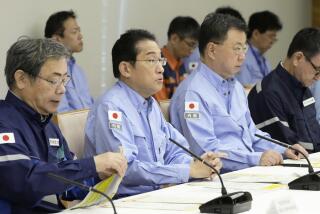Face the Terrible Truth : Denial of Japan’s war crimes by yet another official ill-serves that nation
- Share via
Japan’s new justice minister has denied that the infamous Rape of Nanking in 1937 ever occurred, and says he should know because he was there. That assertion understandably provoked official indignation in China. As the heavily documented record shows, Japan’s conquering army carried out an orgy of murder and rape after it seized the south China city of Nanking, now known as Nanjing. The 1948 war crimes tribunal in Tokyo put the number of Chinese killed at upward of 155,000. Still, Shigeto Nagano, who was a soldier at the time, said the other day it never happened. Moreover, he asserted that Japan’s war in Asia lacked aggressive intent.
Called to account by Prime Minister Tsutomu Hata, Nagano made a public apology for remarks he called “inappropriate”; others would more accurately characterize them as astonishingly insensitive and politically stupid. The apology is unlikely to soften this latest blow to Japan’s foreign relations and its image, especially in China and South Korea, which suffered most from Japan’s aggression.
Nagano’s assertion that the bloody record of Japan’s misdeeds in China is all a “fabrication” is typical of the inability or refusal of some older Japanese especially--not all of them ultranationalists--to honestly confront the darkest and cruelest chapters of their country’s past. It’s only in recent years that prime ministers and the emperor himself have been willing to acknowledge publicly, if sometimes in the most elliptical way, that Japan waged aggressive war in the 1930s and ‘40s.
The long silence of the political leadership had its counterpart in Japanese schools. Textbooks and teachers have traditionally glossed over the war years and the atrocities they included. Only now are the first glimmerings of candor emerging.
Remarks like Nagano’s fuel the suspicions about Japan’s intentions that linger in Asia nearly half a century after World War II ended. Even when withdrawn under pressure, such remarks also encourage those Japanese who insist that the Asian war was meritorious and honorable. Nagano’s crude comments are only the latest reminder of the failure of some Japanese to come to terms with an aggressive past.
More to Read
Sign up for Essential California
The most important California stories and recommendations in your inbox every morning.
You may occasionally receive promotional content from the Los Angeles Times.













